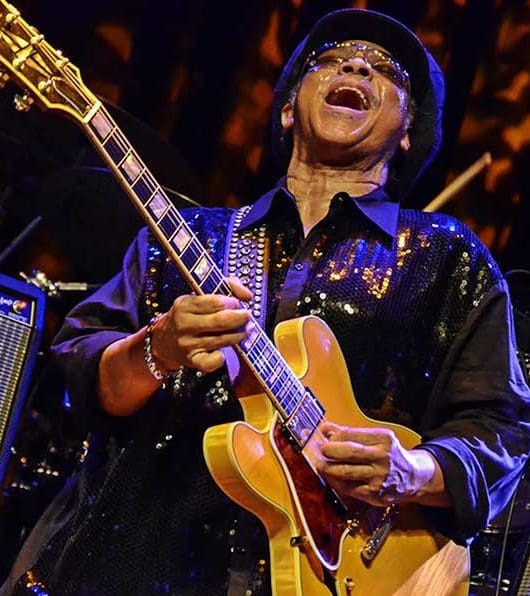Making ABBA: Super Trouper
By Classic Pop | September 6, 2021

One of their most fully formed collections of songs – and a unanimous band favourite – Super Trouper saw ABBA put aside their differences to fine effect… By Mark Lindores
Although ABBA’s sixth studio album took its name from the giant spotlight that glared on the band during their live shows, the four members of the group revealed themselves to be super troopers of a different kind, soldiering on through the catastrophic turmoil that was their personal lives to produce their most accomplished album to date.
While Agnetha and Björn had put on an amicable front when announcing their divorce in 1979, the fact that Björn had met his new partner within a week of his split from Agnetha strained their professional relationship considerably. Also, though unbeknown to the public at the time, Benny had also met a new woman, thus signalling the end of his marriage to Frida.
Therefore, at the dawning of the 80s, ABBA was a very different entity to the fun foursome in flamboyant fashions that captivated the world with their infectious Scandi-pop. On Super Trouper, they emerged, battle scars on display, with an album as rich with emotional depth as it is in complex harmonies – the confessional lyrics testament to Björn’s grasp of the English language and his flair for storytelling.
As initial sessions for the album took place in January 1980, Benny and Björn found themselves struggling to write for the new album. As this was the same predicament they had found themselves in with Voulez-Vous, they once again decided a visit to sunnier climes could help to get their creative juices flowing (not to mention a break from the tensions of their home lives) and headed for Barbados.
The trip was short lived, lasting only 10 days, but was a success, in that it resulted in them having written the first two songs for the album, Happy New Year and On And On And On, the former stemming from the idea of writing a musical that they were still toying with.
Feeling they had made progress with the album, they divided their time in the cottage in Viggsö and in their Polar Studio in Stockholm, penning songs for the album.
With half of an album’s-worth of material written, the band completed a tour of Japan in March (which would be their last), before returning to work on the LP in earnest at the end of May.
As work continued, and Benny and Björn felt that the record was taking shape, they revisited a few older ideas they had recorded and, during one particularly fruitful session, came up with the song that became the centrepiece of the album and would be recognised in the fullness of time as ABBA’s masterpiece.
The Winner Takes It All was released as the first single from the album in July 1980 and is an obvious standout. With a visceral lyric about a couple’s divorce delivered with heartbreaking feeling by the person the track was written about, the track is one of those instances which transcends the boundaries of being a throwaway pop song.
As an emotionally spent Agnetha opines the breakdown of her marriage, the song covers the stages of a broken relationship such as denial, shock, wistfulness and self-punishment, asking her ex questions she doesn’t want the answers to, such as: “Does she kiss like I used to kiss you?/Does it feel the same when she calls your name?”
Although Björn has insisted that The Winner Takes It All is not strictly autobiographical about his divorce from Agnetha, in the sense of there being a winner and a loser, the raw, emotional lyrics can only be a subliminal release. He admitted that once the backing track was complete, the song is one the quickest he’d ever written, with the lyrics pouring out of him.
Aside from the lyrics and Agnetha’s delivery, bathed in choral backing vocals and Benny’s simple cascading piano line, the song is notable for its unusual structure, something ABBA had become masters at ever since their biggest hit, Dancing Queen (which begins halfway through the chorus), taught the pair that there are no rules when it comes to writing timeless pop songs.
The Winner Takes It All is by no means the only song on Super Trouper to explore the pain of the breakdown of relationships. As affecting a song, if not so raw, Our Last Summer finds the wistful Frida of Knowing Me, Knowing You reflecting on a summer spent in Paris, reminiscing of “Walks along the Seine/ Laughing in the rain/ Our last summer/Memories that remain”.
While the song was written by Björn about a summer romance he had while a student, Frida’s interpretation is entirely believable, just one of many standout performances from her on this album, in some cases sadly overlooked due to the dominance of The Winner Takes It All.
Read more: Making Erasure’s The Circus
Completing Super Trouper’s break-up triptych is seasonal standard Happy New Year. Originally planned as the first single from the album, and also at one point a starting point for Benny and Björn’s plans for a musical, the song uses New Year’s Eve as a metaphor for the happy part of a relationship, while the gloomy comedown of New Year’s Day when the fun is over and the uneasiness and uncertainty of what lies ahead proves daunting.
While the introspective ballads form the emotional core of the album, the intensity is countered by some of their greatest pop songs. Safely ensconced in their new Polar Music Studios (Agnetha called it her “second home”), ABBA had the latest in technology at their disposal, and Benny made full use of it – particularly the new Yamaha GX-1 synthesiser, an instrument which proved invaluable in allowing him to experiment in a variety of different genres.
With its keyboards and catchy “Su-per-per trou-per-per” vocal refrain, the title track’s irresistible harmony was the perfect antidote to downcast lyrics which tell of the downside of life on the road.
The band had never enjoyed touring, and now separation from loved ones while on tour was an issue for Björn, who missed his new partner, something he had never experienced with Agnetha as they were never apart. The song shot to No. 1 around the world when it was released as the second single in November 1980.
The feelgood factor is sustained with Me And I – one of the most forward-sounding tracks on the album and a precursor to the sound they’d explore deeper on the The Visitors album.
Taking the premise of a split personality, the song experiments with strong synths and vocodered vocals, which culminate in one of ABBA’s most uplifting, anthemic choruses, likewise with Lay All Your Love On Me.
The song was originally in the style of a traditional hymn, with multitracked vocals for the chorus to give it a choir-like sound, but the addition of a dance beat and piano melody reminiscent of That’s Me, resulted in one of ABBA’s best dance songs. When it was released only as a 12-inch single, Lay All Your Love On Me, became the biggest-selling 12-inch single of all time.
Aside from ballads and synthpop, Super Trouper’s cosmopolitan feel is illustrated with On And On And On, a Beach Boys-inspired rocker in the vein of Does Your Mother Know which veers close to the cool female rockers of the day such as Blondie and The Pretenders, Andante Andante – another of the band’s returns to their schlager material with an endearing lilting country feel, and The Piper – which is a medieval-inspired song that warns of the possibility of a looming dictatorship.
Read more: Making ABBA’s The Visitors
Read more: Top 40 ABBA songs
The album closes with The Way Old Friends Do, an Auld Lang Syne-style sentimental song recorded live as the encore to their Wembley concerts in 1979, accompanied only by accordion.
With more than an air of swansong to it, the album as a whole suggests that ABBA maybe knew their time was coming to an end – a theory supported by the album’s artwork, a shot of the group in a moodily lit circus setting, surrounded by a specially invited audience made up of their family and closest friends.
If it was the case that ABBA were planning their farewell, they were going out on a high. Super Trouper was met with unanimous critical acclaim upon release – a first for the group, and it became their biggest selling album. Entering the charts at No. 1 in nine countries, Super Trouper exceeded sales of over one million in advance orders alone in the UK, a record at the time.
As well as being a firm fan favourite, unusually, perhaps, all four members of the group cite Super Trouper as their favourite album, because it works as a collection of songs and each is strong enough to stand individually.
Speaking in the Words And Music documentary, Frida says: “You usually feel that each album you do is the best you’ve ever done, but I have to say that Super Trouper is a little different. Because we’re pleased with each and every song on the album.”
Check out ABBA’s official website here
Read more: Making Blondie’s Parallel Lines






